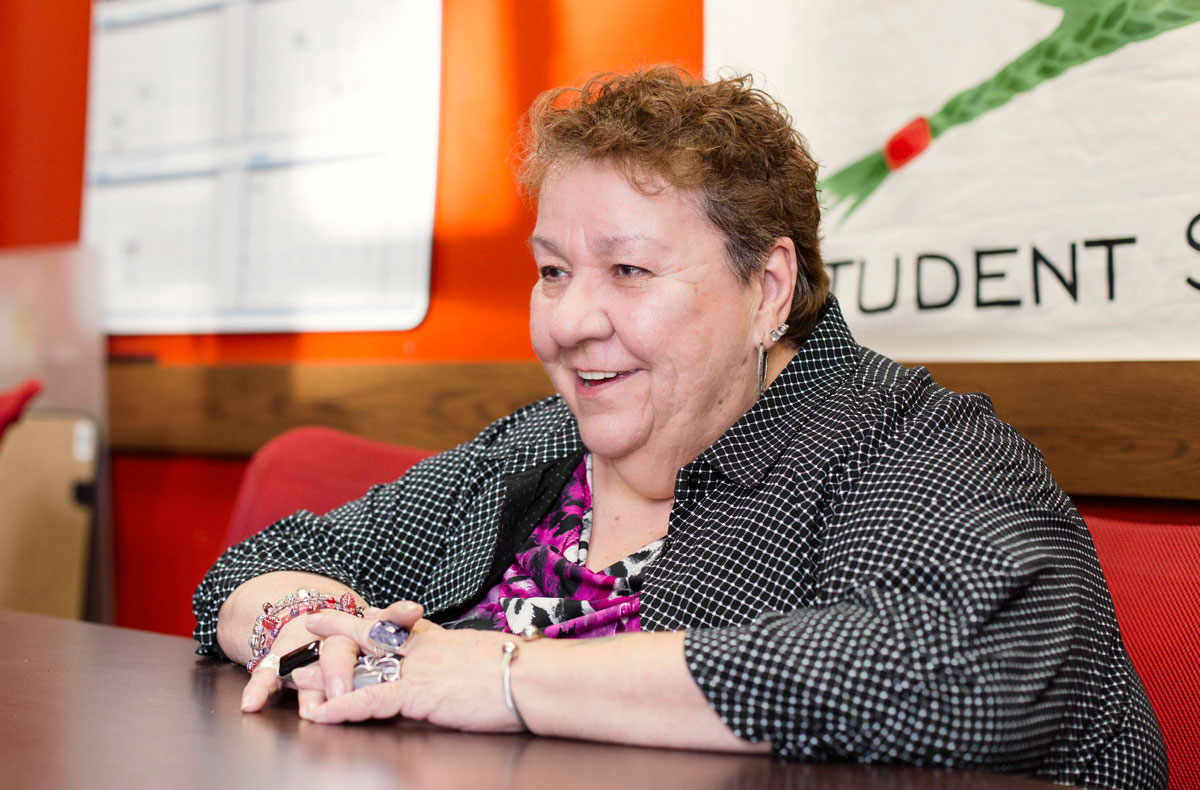Joanne Dallaire: Never wavering from her truth

Photo: Joanne Dallaire will step back from counselling, continue as campus Elder. Photo by Alia Youssef.
One of the most significant moments of Joanne Dallaire’s time at Ryerson came on January 26 through a gesture as deeply profound as it was seemingly simple.
At the ceremony to present Ryerson University with a community consultation report in response to the Truth and Reconciliation Commission report, Ryerson’s President (Mohamed Lachemi) and Provost and Vice-President, Academic (Michael Benarroch) were wrapped in a Star Blanket. The act symbolized the responsibility of the Ryerson officials in responding to the TRC report, while also representing a gesture of peace and goodwill. In 2010, the blanket had been gifted to Ryerson upon the launch of the Aboriginal Education Council, commemorating a new era of Ryerson University/Indigenous relations.
“To be wrapped in a star blanket—people who aren’t from Indigenous communities might not grasp the tremendous importance of what that means,” says Dallaire. “That’s something that is very rarely done, and it’s not done easily—there has been a lot of work done. So it’s big that Ryerson is making this commitment.”
For Indigenous Peoples, the history of education in Canada has been dominated by colonialism and abuse, and trust cannot be easily rebuilt. That’s why it was a surprise even to Dallaire—Shadow Hawk Woman of the Wolf Clan, a Cree Omushkego with ancestry from Attawapiskat, Ontario—that she joined Ryerson 13 years ago. Since 2005, she has served as Elder for the Aboriginal Education Council and in the Office of Aboriginal Initiatives, and is now wrapping up her tenure as traditional counsellor in Aboriginal Student Services.
“I’ve always been a person who knows where I’m guided to,” says Dallaire. “I was thinking, ‘Boy, this is interesting—I would’ve never thought I would be in this role,’ but I knew I was there for a reason.”
Dallaire’s career as an educator and counsellor has spanned over three decades, including work for the Ministry of Health Canada, the Centre for Addiction and Mental Health, and a range of First Nations and social service agencies. She quickly learned that while the environment may change, the issues remain constant. “I’m pretty naïve on many aspects. I became more and more knowledgeable on the politics, and was like, ‘Oh, okay… this is a familiar struggle! It’s been a lifelong struggle—this is just the way it’s packaged in this environment.’ But I also knew that I was there for a reason. I know I have a strong voice; I know I’m not afraid to confront difficult issues.”
At Ryerson, she has overseen educational events and ceremonies, helped incorporate Indigenous knowledge/methodologies in the curriculum, and trained faculty in the Blanket Exercise (a participatory workshop illustrating Canadian-Indigenous history). In 2012, she participated in the presentation of the Eagle Staff to Aboriginal Student Services. January’s unveiling of the (PDF file) Truth and Reconciliation Report at Ryerson University was the result of a two-year community consultation conducted by Dallaire and Denise O’Neil Green (vice-president, equity and community inclusion) to determine how to improve relations with—and increase representation of—Toronto’s Indigenous communities through education.
Outside of this high-profile work, Dallaire has worked quietly as a counsellor for Ryerson’s Indigenous students. “I think her strength comes from her ability to be present to people, to really hear folks, and to make it clear that she doesn’t give advice—she reflects back what she hears,” says Monica McKay, director of Aboriginal Initiatives. “If she is offering suggestions, they’re suggestions that you actually can follow through on.”
For McKay, Dallaire’s effectiveness as an Indigenous representative comes from her empathy and experience. “She’s very clear about having a foot planted in the Indigenous world and a foot planted in the western world. Certainly her skills and abilities come from experience of using tools from both worlds.”
For her part, Dallaire is encouraged by the response to the Truth and Reconciliation Commission, both on and off campus. “With all the work and engagement Ryerson has made, and all the training that has taken place in various departments, it is heartwarming to see the enthusiasm and the heartfelt sincerity of people when they understand: ‘Oh my god, no wonder!’ It’s just wonderful to see the eyes of fellow Canadians open wide, because if this can happen to one group, it can happen to another group. We can’t turn a blind eye to anything like this.”
Through it all, Dallaire has never lost sight of her role as an educator. “You cannot change a person’s mind unless you educate them,” she says. “You can scream and holler, ‘This is really important,’ but if people don’t understand why it’s really important, it doesn’t make any difference. The Blanket Exercise has been a huge, huge vehicle for change—or at least awareness. That kind of stuff takes a while to settle in—it’s pretty shocking when you hear about it for the first time.”
Though stepping back from counselling, Dallaire will continue as Ryerson’s campus Elder. When asked what she has been proudest of, “Never wavering from my truth. … Sometimes it’s easier not to say something, or not to do something. I’m very proud of myself that I always stood on my truth. It’s one of the things I really value.
Being in my truth is vitally important to me in order to work with other people in their truth—no matter how vastly different it is.”
She adds, “If the truth is you hate my guts, then that’s okay! We don’t have to like each other, but I don’t want you to pretend you have to like me.”